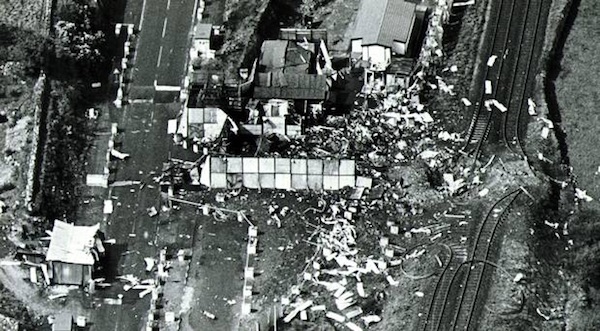
Concerns are growing that a failure to negotiate a solution to the issue of the border after Brexit could spark a return of serious violence in the north of Ireland.
The Dublin government clashed with the unionist DUP after they accused Taoiseach Leo Varadkar of scaremongering over the potential for conflict.
Minister for Foreign Affairs Simon Coveney then accused the Tories and DUP of ignoring or denying the risk for political reasons.
“There are some people who just don’t want to know because it doesn’t suit the political narrative that the Northern Ireland border issue is a really important issue for relationships on this island,” he said.
DUP Brexit spokesman Sammy Wilson had condemned Varadkar’s decision to show EU leaders in Brussels a newspaper story about a 1972 bomb attack on a customs post in Armagh. He said it “scrapes the bottom of the very deep barrel of threats, deception and rhetoric” and that it was “despicable, low and rotten”.
Three IRA Volunteers, four customs officials and two lorry drivers died in the attack at a British customs clearing station in the border town of Newry.
Mr Varadkar said he used the story -- just one of thousands of violent incidents which have taken place at the border in recent decades -- to make sure that there was no sense that anyone in the Dublin government was “in any way exaggerating” the “real risk” of a return to conflict.
The exchanges came after another week of fruitless efforts to convince British negotiators to honour a promise of a ‘backstop’ that would guarantee no return of border checks, first made in December last year.
Under pressure from the DUP and the far right within her party, British prime minister Theresa May has suggested a future “expiration date” for the backstop -- a date when the border could once again be remilitarised. That was quickly rejected by EU and Irish negotiators.
There have been statements and commentary by a number of unionist hardliners on the potential of violence.
Earlier this month, the DUP were accused of making “dog whistle” calls to loyalist paramilitaries after party leader Arlene Foster’s said she had ‘blood red lines’ in the Brexit negotiations. A DUP official was then reported as commenting that the party planned a “guerrilla war” against any new regulations dividing Ireland and Britain. Loyalist Jamie Bryson this week threatened a violent unionist reaction that would “dwarf” the flag disturbances and Drumcree riots if their demands for a hard border are not met.
A former British Army chief, General Richard Dannatt, has joined police chiefs by warning of the possibility of a return to bloodshed in the event of a hard border. Prominent Tory and TV celebrity Stanley Johnson, father of senior Tory figure Boris Johnson, also made the headlines when he blithely dismissed concerns over renewed conflict by saying: “If the Irish want to shoot each other they will shoot each other”.
Mr Coveney said his government was “trying to protect a very precious peace and normality on the island of Ireland”. He said Mr Varadakar’s comments were warranted and the Taoiseach was “dealing in facts”.
“If you speak to families living in the border area they will talk in very emotive terms about their fears of the re-emergence of that border infrastructure and it’s important to be honest about that.
“It doesn’t suit some people’s political narrative. It certainly doesn’t suit people who advocate for Brexit because this is very awkward and difficult to deal with but it’s the truth,” he added.
Mr Coveney said he believed a no-deal outcome was still very unlikely, but in the event of a no-deal scenario, his government had no physical contingency plans for border infrastructure as it would not be accepted.
“I’m not going to create the impression that somehow by accident we’re going to fall into a situation of being forced to reintroduce border infrastructure” he said.
“I trust the British prime minister in terms of her [backstop] commitments - it has been made in writing,” he added.
Although there has been an effective ceasefire, a number of republican armed groups are understood to remain intact and to be in contact with each other. A recent statement from Oglaigh na hEireann (ONH) indicated it had held local discussions with the ‘new IRA’ and the INLA (Irish National Liberation Army), as well as the previously unknown ‘North Derry Republican Group’.
Sinn Fein leader May Lou McDonald said there could be no excuse “for a return to conflict under any circumstances or provocation”. She added: “It is reckless to risk progress, our agreements, and all that has been achieved over the past decades. No leader or politician of integrity would be prepared to play chicken or poker with our future and our peace.”
![[Irish Republican News]](https://republican-news.org/graphics/title_gifs/rn.gif)
![[Irish Republican News]](https://republican-news.org/graphics/title_gifs/harp.gif)

